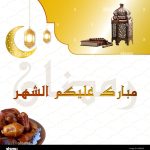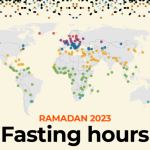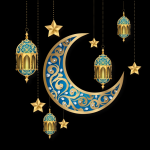Embrace The Blessings Of Ramadan Moubarak: Unite, Reflect, And Take Action Now!
Ramadan Mubarak: A Month of Spiritual Reflection and Celebration
Introduction
1 Picture Gallery: Embrace The Blessings Of Ramadan Moubarak: Unite, Reflect, And Take Action Now!

Dear Ramadhan enthusiasts,

Image Source: freepik.com
Welcome to a month of blessings and spiritual growth! Ramadan Mubarak is a significant time for Muslims around the world, as it marks the beginning of a month-long period of fasting, prayer, and reflection. In this article, we will explore the essence of Ramadan Mubarak, its traditions, and the impact it has on the lives of millions of individuals. Join us on this journey of understanding and enlightenment.
What is Ramadan Mubarak?
🌙 Ramadan Mubarak, also known as the Holy Month of Ramadan, is a time of fasting and spiritual reflection observed by Muslims worldwide. It is the ninth month of the Islamic lunar calendar, and during this sacred period, Muslims abstain from food, drink, and other physical needs from dawn until sunset.
🕌 The fast is seen as a way to purify the mind, body, and soul, and to draw closer to Allah (God). It is a time of self-discipline, sacrifice, and increased devotion to worship. Ramadan Mubarak is a time of heightened spirituality and a reminder of the blessings bestowed upon the Muslim community.
✨ The month of Ramadan is also marked by acts of charity, increased prayer, and recitation of the Holy Quran. It is a time for Muslims to strengthen their relationship with Allah and seek forgiveness for past sins.
Who Observes Ramadan Mubarak?
🕌 Ramadan Mubarak is observed by Muslims worldwide, regardless of age, gender, or nationality. It is a time when the entire Muslim community comes together to engage in acts of worship, charity, and reflection.
🌍 From Indonesia to Morocco, from Nigeria to Malaysia, Muslims from various cultures and backgrounds unite in their dedication to observing the sacred traditions of Ramadan Mubarak. It is a testament to the universal nature of Islam and the shared values that bind Muslims across the globe.
🤲 The observance of Ramadan Mubarak is not limited to adults; children are encouraged to participate in fasting and other religious activities according to their abilities. It is a time for families to come together and teach their children about the importance of faith and devotion.
When Does Ramadan Mubarak Take Place?
🌙 Ramadan Mubarak begins with the sighting of the new moon, which varies depending on the lunar calendar. The exact start date of Ramadan Mubarak shifts each year and is determined by the sighting of the moon by Islamic scholars and authorities.
⭐ The duration of Ramadan Mubarak is typically 29 or 30 days, depending on the sighting of the moon at the end of the month. The end of Ramadan Mubarak is celebrated with the joyous festival of Eid al-Fitr, which marks the breaking of the fast and is a time of feasting, giving thanks, and sharing joy with loved ones.
Where is Ramadan Mubarak Celebrated?
🌍 Ramadan Mubarak is celebrated by Muslims in every corner of the world. Mosques and Islamic centers become centers of activity, with increased attendance for daily prayers, Quran recitation, and communal iftars (the meal that breaks the fast).
🕌 The atmosphere during Ramadan Mubarak is vibrant and filled with a sense of unity. Muslims gather to perform taraweeh prayers, engage in acts of charity, and seek spiritual fulfillment in the company of fellow believers.
🌇 In predominantly Muslim countries, such as Saudi Arabia, Egypt, and Indonesia, the observance of Ramadan Mubarak is deeply ingrained in the culture and society. Non-Muslim majority countries also respect and acknowledge the significance of Ramadan Mubarak, allowing Muslims the freedom to practice their faith during this holy month.
Why is Ramadan Mubarak Important?
💫 Ramadan Mubarak holds immense spiritual and social significance for Muslims. It is a time for self-reflection, self-discipline, and increased devotion to Allah. Fasting during Ramadan Mubarak allows Muslims to experience hunger and thirst, developing empathy for those less fortunate and fostering gratitude for the blessings in their lives.
🌙 Ramadan Mubarak also serves as a time for Muslims to strengthen their relationship with Allah through increased prayer, recitation of the Quran, and acts of charity. It is a month of seeking forgiveness and purifying the soul.
🤝 Additionally, Ramadan Mubarak promotes unity and compassion among the Muslim community. Muslims come together to break their fasts, share meals, and support one another in their spiritual journey.
How is Ramadan Mubarak Celebrated?
🌙 The main practice during Ramadan Mubarak is fasting from dawn until sunset. Muslims wake up before dawn to have a pre-dawn meal called suhoor, and they break their fast with dates and water at sunset, followed by prayer and a meal known as iftar.
🕌 In addition to fasting, Muslims increase their acts of worship and engage in additional prayer, particularly the taraweeh prayer performed after the evening prayer, usually at the mosque.
📖 Recitation of the Holy Quran is also emphasized during Ramadan Mubarak. Muslims strive to complete the recitation of the entire Quran during this month and reflect on its teachings.
🤲 Acts of charity are a core part of Ramadan Mubarak. Muslims are encouraged to give to the less fortunate, donate to charitable causes, and engage in acts of service to their communities.
Advantages and Disadvantages of Ramadan Mubarak
Advantages:
1. 🌙 Spiritual Growth: Ramadan Mubarak provides an opportunity for individuals to deepen their spiritual connection with Allah and strengthen their faith.
2. 🤝 Unity and Community: Muslims come together to break their fasts and engage in acts of charity, fostering a sense of unity and compassion.
3. 🌍 Global Solidarity: Ramadan Mubarak is celebrated by Muslims worldwide, reinforcing the global identity of the Muslim community.
4. 💪 Self-Discipline: Fasting during Ramadan Mubarak instills self-discipline and promotes self-control over physical desires.
5. 🧠 Mindful Reflection: The month of Ramadan Mubarak encourages introspection, self-reflection, and contemplation of one’s actions.
Disadvantages:
1. 😴 Fatigue: The long days of fasting can lead to fatigue and decreased productivity for some individuals.
2. 🥵 Physical Discomfort: Hunger, thirst, and the adjustment of the body to the fasting schedule may cause temporary physical discomfort.
3. ⛔ Limited Social Activities: Muslims may have to limit their participation in social events due to fasting and religious obligations.
4. 🍽️ Dietary Challenges: Planning and preparing nutritious meals for both suhoor and iftar can be time-consuming and require careful consideration of dietary restrictions.
5. 🌙 Sleep Schedule Disruption: Waking up before dawn for suhoor and engaging in additional prayers during the night may disrupt sleep patterns.
Frequently Asked Questions (FAQs)
1. Can pregnant and breastfeeding women fast during Ramadan Mubarak?
Yes, pregnant and breastfeeding women are exempt from fasting during Ramadan Mubarak. However, they are encouraged to make up the missed fasts at a later time or provide an equivalent amount of food or monetary assistance to those in need.
2. Are children required to fast during Ramadan Mubarak?
Children are not required to fast until they reach puberty. However, many children begin practicing fasting for a few hours a day to learn about the significance of Ramadan Mubarak and gradually ease into full-day fasting.
3. Can individuals with medical conditions fast during Ramadan Mubarak?
Individuals with medical conditions should consult with their healthcare providers before fasting during Ramadan Mubarak. Those with chronic illnesses or conditions that may pose health risks are exempt from fasting and can instead engage in alternative acts of worship.
4. What is the significance of the Night of Power (Laylat al-Qadr) during Ramadan Mubarak?
The Night of Power, also known as Laylat al-Qadr, is one of the most significant nights during Ramadan Mubarak. It is believed to be the night when the first verses of the Quran were revealed to Prophet Muhammad (peace be upon him). Muslims spend this night engaged in prayer, seeking blessings, and supplicating to Allah.
5. How can non-Muslims support their Muslim friends and colleagues during Ramadan Mubarak?
Non-Muslims can show support and respect for their Muslim friends and colleagues by being mindful of their fasting, refraining from eating or drinking in their presence during fasting hours, and offering words of encouragement and understanding. Additionally, learning about Ramadan Mubarak and its significance demonstrates a commitment to fostering inclusivity and interfaith dialogue.
Conclusion
In conclusion, Ramadan Mubarak is a time of self-reflection, increased devotion, and spiritual growth for Muslims around the world. It is a month filled with acts of worship, charity, and unity, bringing Muslims closer to Allah and to one another. As we embark on this sacred journey, let us embrace the blessings of Ramadan Mubarak and strive to make the most of this spiritually enriching time.
Final Remarks
Dear readers, we hope that this article has provided you with a deeper understanding of Ramadan Mubarak and its significance. May this month be a source of blessings, peace, and spiritual rejuvenation for all. As we conclude, we would like to remind everyone to consult with Islamic scholars or local authorities for specific guidelines and practices related to fasting during Ramadan Mubarak. Ramadan Mubarak to all!
This post topic: Ramadhan



